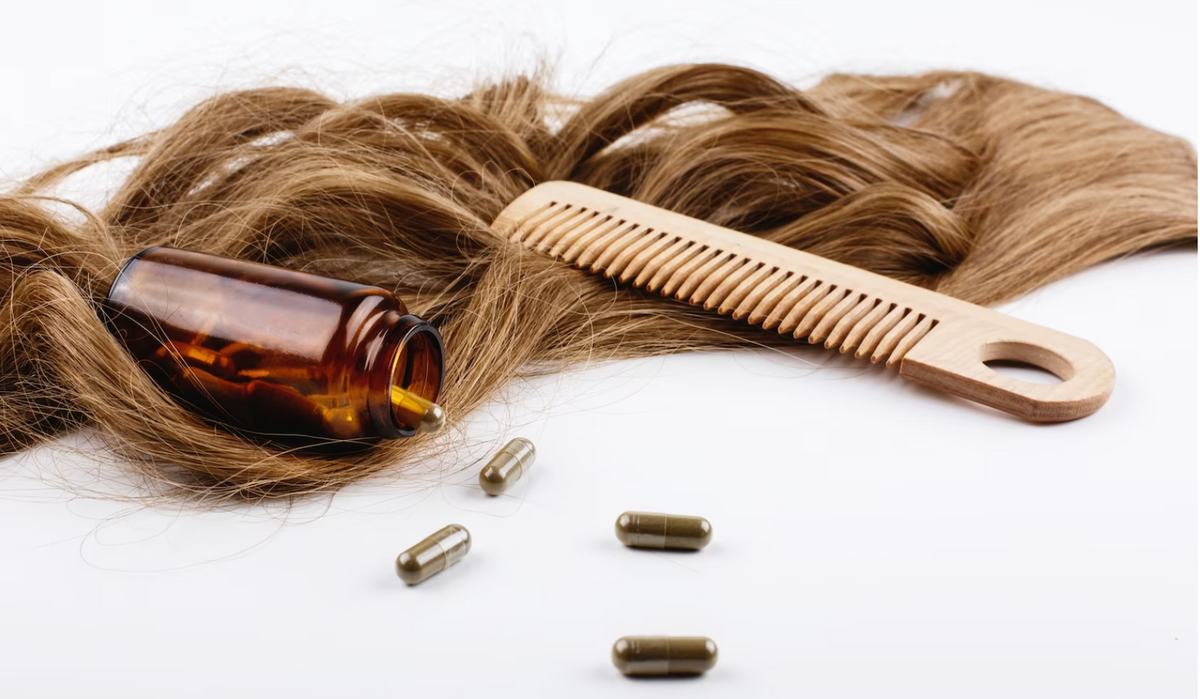
Zinc for Hair Loss and Dandruff Prevention
|
Time to read 5 min
Are you 18 years old or older?
Sorry, the content of this store can't be seen by a younger audience. Come back when you're older.
|
Time to read 5 min
Zinc is a naturally occurring mineral that humans need to consume daily in order to maintain the many chemical reactions in the body. It is responsible for helping our enzymes catalyze chemical reactions in order to support the creation of DNA, the growth of cells, the building of proteins, the healing of damaged tissue, and keeping our immune system healthy.
How does any of that translate to hair care? Well, biologically, the above processes mentioned are directly tied to hair growth and hair maintenance. Without zinc, most of those reactions would take too long to happen, or might not happen at all. If DNA is not constantly created, new cells, like hair cells, cannot grow. If proteins are not built, hair, which is made of protein, is not built. When your scalp is damaged and there is no zinc available in your body, you won’t be growing hair out of your damaged scalp. If your immune system is weak, your hair follicles will be weakened after exposure to damaging microbes, which then leads to hair loss.
One of the possible answers for unexplained hair loss is zinc deficiency. Since zinc is related to the maintenance of your body’s natural process, the lack of zinc leads to various health deficits. Those deficits include the loss of your body’s ability to produce good levels of keratin, (the protein your hair is made of). Keratin is a hard-textured protein that is not easy to make. It is also not an essential protein, so your body will produce less of it to make up for the other, more vital proteins you need. This means you will also experience hair thinning if you are low on zinc all the time since your body won’t be prioritizing your hair.
Zinc for hair loss is also something to consider. Zinc supplements are often prescribed to people who are experiencing strange happenings with their hair such as hair loss, hair thinning, or an increase in dandruff and dryness of the scalp. Zinc is great for strengthening your hair follicles so that these symptoms don't occur.
Zinc, as an essential vitamin, helps with hair growth by keeping the oil glands around the hair follicles working properly, and as mentioned, helps with the body’s natural protein production processes. Therefore, zinc is a necessary mineral needed to prevent the development of dryness, irritation, and ultimately the formation of dandruff. If you have a lack of zinc, you will be feeling the effects of weakened hair follicles immediately, for the malfunction of the oil glands in your scalp will cause a plethora of problems for the maintenance of your hair. You will have unlubricated hair follicles that slow the growth of your hair and irritate your hair’s roots. Your scalp will be dry and flake off, forming dandruff. After dandruff, the even greater consequence is the loss of hair.
One thing to note about anti-dandruff products, such as anti-dandruff shampoos and conditioners, is the common use of the compound called “Zinc pyrithione”. Zinc pyrithione is an essential ingredient in anti-dandruff shampoos because it is antifungal, antibacterial, and antimicrobial. Dandruff is the result of either an irritated scalp, dry skin, or a yeast-like fungus called Malassezia. Zinc pyrithione targets any sort of microbial or fungal infection of the scalp that causes dandruff, aiding with the recovery of scalp health more efficiently than that of shampoos or conditioners without the compound. However, Zinc pyrithione is not present in most shampoos and conditioners because it is not necessary to use it if you are not ailed by dandruff. It is not recommended to overuse Zinc pyrithione or have levels of zinc that are too high, much like any other mineral or chemical.
Fortunately, zinc is readily available in a lot of normal foods and diets, and humans only need to consume a tiny amount of zinc a day (only 8 mg for females and 11 mg for males). Zinc deficiency is not a common occurrence, and usually, affects only those with digestive disorders that don’t allow them to absorb zinc into their bodies easily.
Zinc is also found in several types of scalp treatments and hair products for its use for hair growth and scalp health. Zinc in different forms, has the potential to support hair growth, strengthen hair follicles, and increases hair volume.
If you’re worried about not having enough zinc in your body, here are some foods that ensure you’re actually getting the right amount a day.
Learn more about zinc in food. → Healthline
Zinc for hair loss is commonly used in several haircare products for scalp treatment, but when thinking about scalp treatment, you have to consider what symptoms you are targeting. Scalp treatment can range from removing microbial infections that lead to dandruff, strengthiening your hair follicles, or nourishing your scalp with moisture and nutrients. Zinc is a great ingredient in all of these types of treatments, but there are different types of zinc that treat each problem differently.
RKT Scalp treatment contains zinc to support the growth and maintenance of your hair and scalp. Zinc PCA is one of the ingredients used in RKT scalp treatment, and it targets the nautral oils in your hair. Zinc PCA regulates sebum secretion, which is one of the causes for dandruff and regulating the oil levels in your hair is also good for the growth of your hair. By removing excess sebum secretion, which clogs both hair follicles and pores, your hair can grow to its fullest potential, unrestricted by clumpy oils.


